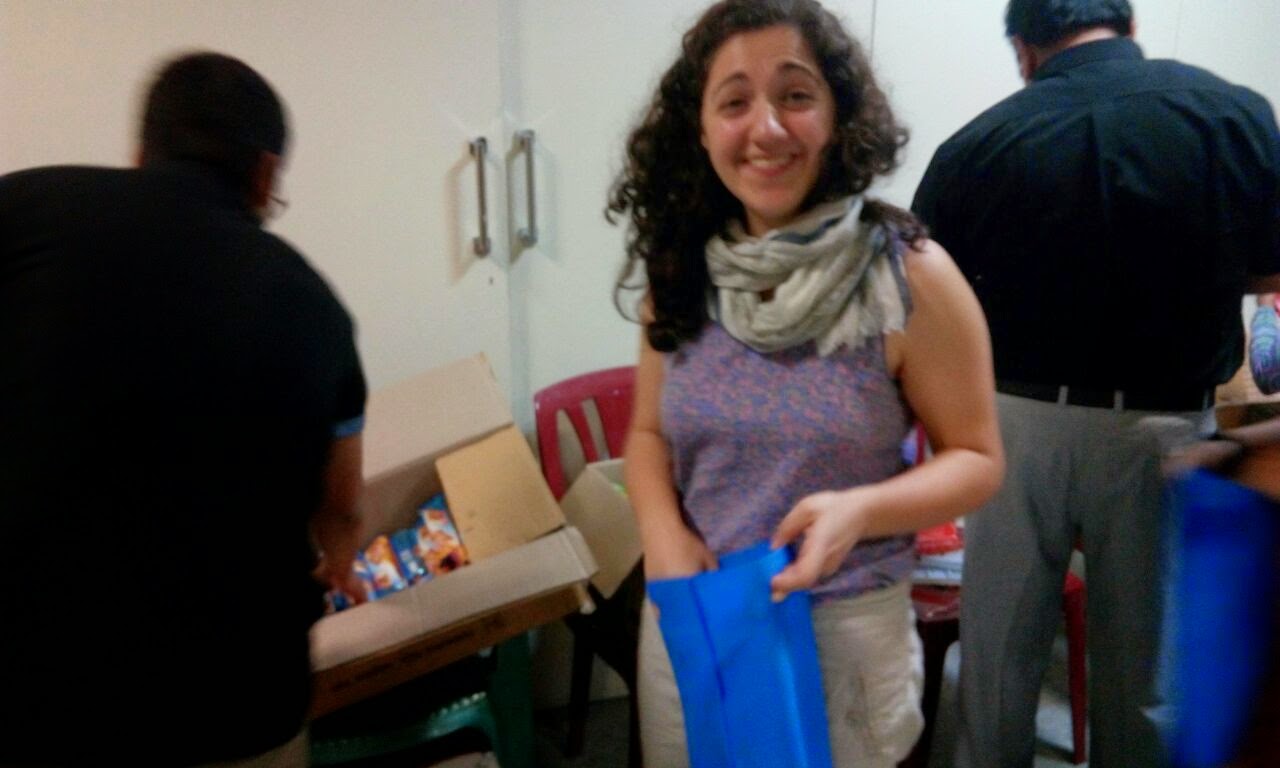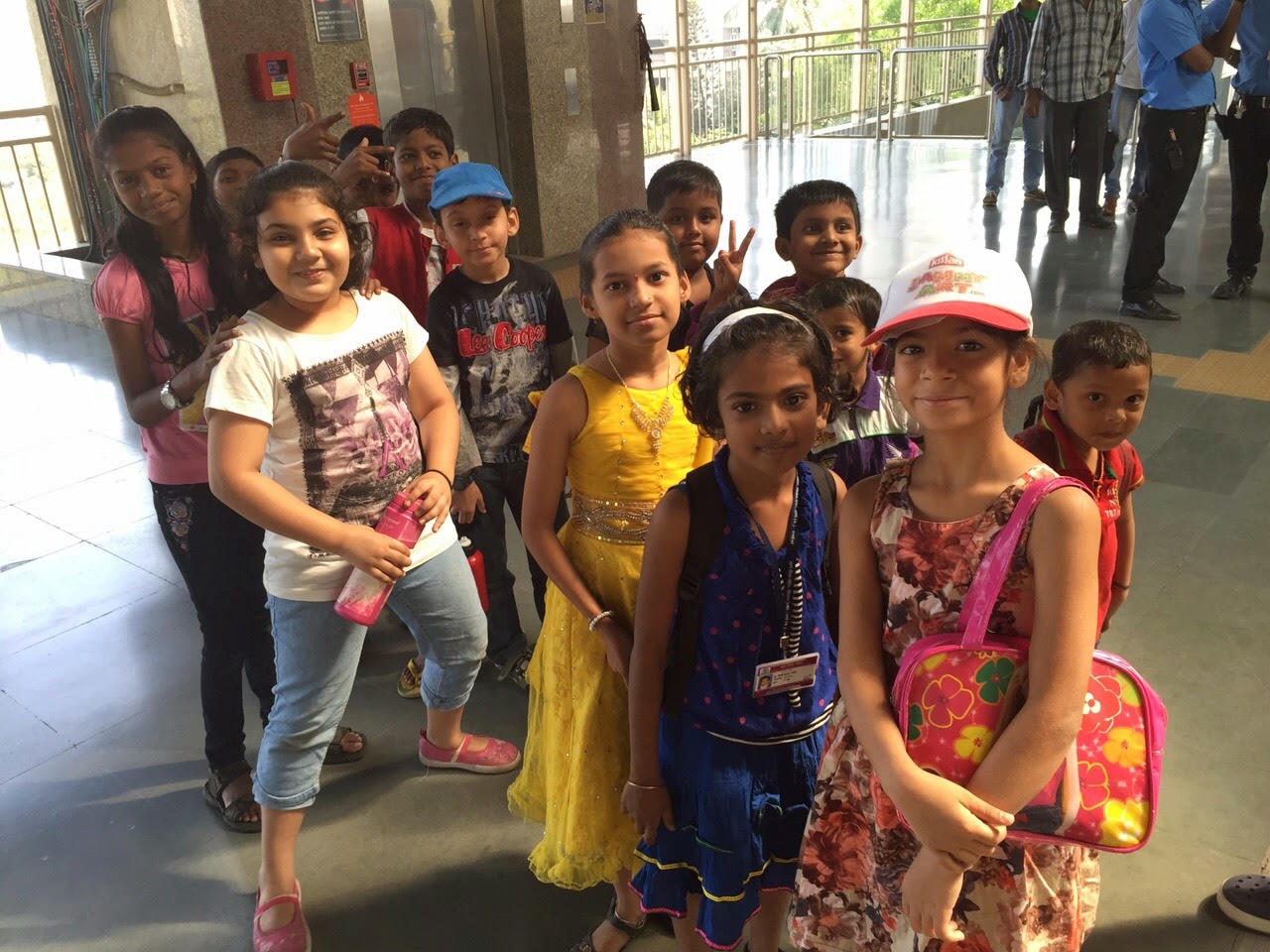
Emily Weinstein, a 23-year-old graduate of Fordham University graduate and New Jersey native, is a participant in the current 12th cohort of GPM international volunteers. Emily brings with her a wealth of experience in international volunteering, and some profound insights into development work. In an interview with GPM founding director Jacob Sztokman, she talks about her love of the children she is working with and the impact of her encounters with the Jewish community of India – and she says that GPM is unlike any other volunteer program that she has been part of. Read the rest of the interview to find out why.,,
J:
Welcome Emily. How are you?
E:
I’m excited to be here
J:
Tell me about yourself. Where are you from?
E:
My parents live in New Jersey. I’m originally from New York. I went to Fordham University in New York, studying anthropology, visual arts and photography, a little bit of everything.
J:
So you’ve been here for two weeks now. What made you decide to come on GPM?
E:
I had done volunteer programs before. I had worked in Ghana briefly. It was a wonderful experience, to tell you the truth. But I really like GPM. It is really different. First of all, working together with the Jewish community in India is really different. It’s not just someone coming in from the west, having no knowledge about India. I mean, I knew a little bit about India. But working with the Jewish staff, I felt like I was coming in to a community that I had familiarity with, at least on that level.
J:
Instead of feeling like a foreigner, it’s more like you’re coming in to a community that you have a connection with?
E:
Exactly. We have something in common, so it just made it that much easier to be in India and integrate into my surroundings. Also, I love working with children. And that’s part of the reason why I was so attracted to this program. I didn’t know so much about the slums or about the poverty situation in India. Coming in to see that has been pretty drastic, a little traumatic. But it’s great to feel like I’m part of something that’s working to remedy that in some small way.
J:
What was your reaction to the slums?
E:
When I first got there, it was worse than I was expecting. The hardest part is seeing the children and how the situation affects them. I mean, there are some children in our class who are sick, and it seems like they are perpetually ill. Like one child, sometimes during games she has to sit out because she can’t. A lot of the children seem, I guess, delayed. I was a babysitter in the United States for over a decade so I’ve worked with lots of children, and I know where they should be at that point in their lives. These children are far behind and it’s hard to see that. We come in and we bring these lessons and we ehope that they gain something from the information that we’re bringing. But maybe the most important thing is that someone is thinking about them outside of their world. Maybe that’s really the most important thing.
J:
The slums were worse than you thought
E:
I mean, it’s exactly what you told us it would be. But imagining and seeing are two totally different things. It’s difficult to process.
J:
Last weekend GPM took the children to a park for an activity with the local Jewish interns. How was that?
E:
It was amazing to see the children. The park was near the ocean. Even I was taken aback by how beautiful it was. Many of the children had never seen the ocean before. To see the children’s reactions was very special.
The program itself working with the local Jewish staff members was really great. The lessons we were delivering were about health and about fruit and vegetables. The kids were so sweet and they loved the lessons and picked it all up very quickly. They were so happy just to see us here. It was really great. I mean, I was a little nervous coming in. I didn’t know how we would be received as volunteers. It was a new experience for me to work with a local staff. But they are all so professional and well prepared and they really know what they are doing and they made us feel really comfortable. It was a great introduction for us to working with the kids. It was our first time really running a program. It was really amazing. I really enjoyed it.
J:
So you worked in Ghana before this?
E:
I was working at a human rights law office. It was through a UK volunteer organization. I worked on three projects. In one, we would go into local high schools in Accra and teach a curriculum about the Universal Declaration of Human Rights. In the second, we also worked on a women’s outreach program. And we would go into communities and speak to women, usually older women in traditional communities where most men have multiple wives. Ghana only recognizes one wife, so once the man dies, if he doesn’t have a will, there are a lot of times when women and children are left with nothing. We would teach the women about the laws and about wills and we had a pro bono lawyer helping the women with wills. The third program was working with children on a child trafficking. We would go in and work with children, a lot of older boys who had been trafficked, who lost very important years when they should have been in schools. We had 18 year old boys reading and writing at a first and second grade level. So what we did was we came in and found out how well they were reading and writing and we were able to report to the teachers.
J:
Why did you choose to volunteer instead of just going to university or traveling?
E:
I was at university at the time that I went to Ghana. It was between my freshman and sophomore years. I knew I was interested in humanitarian and development work. I was working at the time with an Ethiopian non-profit. I had been working with them since my freshman year of college. And I really wanted to go to Africa and see the situation there. I originally wanted to go to Ethiopia because that was my experience. It was my colleagues and the culture that I was engrossed in. I stumbled upon this program in Ghana in human rights and I’ve always been passionate about human rights so it seemed like the perfect fit, so that’s how I ended up in Ghana.
In terms of GPM, so I had initially applied for a yearlong fellowship in JDC in Ethiopia, but the position was taken. But it all worked out – because I ended up in this amazing program in India! And my mother likes to remind me, she says, ‘You wrote a report on India when you were in fourth grade!’ So I knew basic things about India. I knew a little about Gandhi, about caste systems, and Hinduism. And I knew the slums existed but I didn’t know much about them. And I learned about this opportunity to really work with children, which is a major passion of mine. So I said it sounds like the perfect program for me!
J:
So what’s next for you?
E:
Trying to figure that out myself, every day. Right now I’ve been giving a lot of thought to the whole humanitarian versus development aspect of my career. I’m very passionate about it. But there are a lot of things about working in a career where you, as a westerner, come into developing countries, it’s hard for me and I’m having trouble with that. So that’s why I like being a photographer. I like going in and taking pictures of the program and helping organizations like GPM promote their programs. I want to help spread the word so that people like me who are passionate about it can find out about it and hopefully participate and make a difference. That’s kind of where I see myself
J:
You’re saying that you have an issue with westerners coming in and doing development for local people?
E:
I have an issue when they come in and don’t work with local people. That’s why I like GPM so much, because I think that it’s an amazing organization. It brings in volunteers from all over the world. It doesn’t have to be just western volunteers. The local staff, they are so amazing, they have been so helpful and so influential. All of our skills that we have been able to bring have been enhanced and complemented by them. We need each other. I think that’s one of the reasons why GPM is so successful
For me, as someone growing up wanting to go in and help people who have so much less than I did, I went to school and started studying I’m trying to find my place in this industry.
I don’t always love volunteer programs but I really love GPM. I think a large part of it is that you found a wonderful staff. They really empowered us to do so much. You created a wonderful model. I’m so happy that JDC gave me the opportunity to do this. They made this happen for me.
J:
Thanks so much Emily.




















































